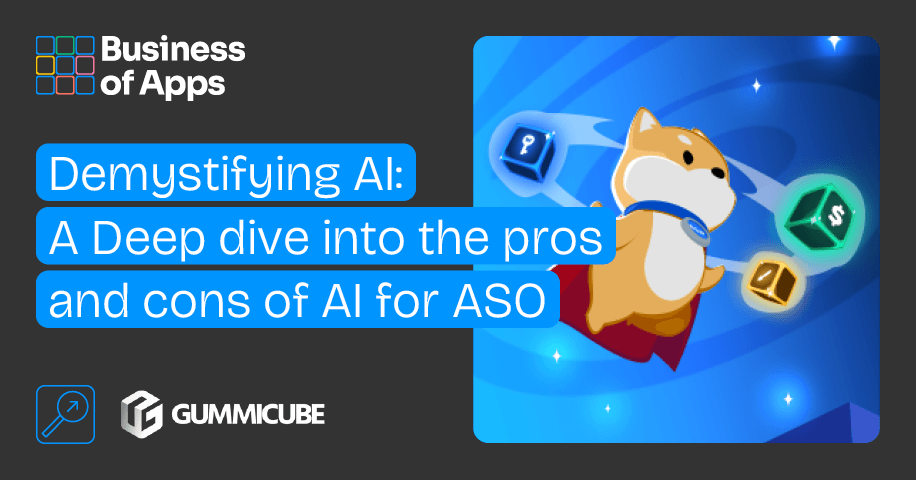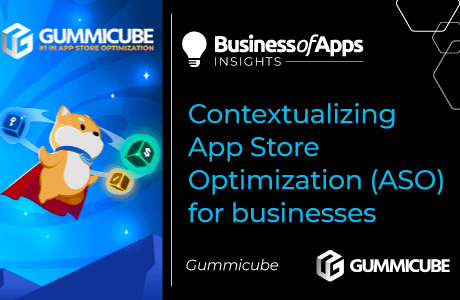In the ever-evolving landscape of App Store Optimization (ASO), Artificial Intelligence (AI) is emerging as a multifaceted tool. Numerous companies are fervently developing and proudly showcasing the potential of AI. Before we all run and jump on the bandwagon, it’s crucial to assess the advantages and drawbacks of AI in ASO. Knowing the when and how of incorporating AI into ASO is a prudent step in navigating this transformative landscape.
AI’s harmonious role in App Store Optimization: Focusing on efficiency at its core
AI brings a wealth of benefits to the table. Let’s deep dive into some key ways to effectively use AI:
- Metadata auditing: AI can help with auditing, identifying and rectifying repetition, duplicates, and basic errors in metadata.
- Metadata and creative development: From crafting generic creatives to giving guidance on more keyword options, AI can help flesh out any projects that have been started.
- Description: AI can be there to help wordsmith a description that has previously been outlined or copywritten; generating different versions of descriptions for testing (used only after serious review by real humans in charge).
Google is now venturing into AI to assist developers in the Google Play Store, but could it do more harm than good? We’ll examine Google’s new product offering to glean insights into this emerging field.
Google’s ASO AI offering: The “experimental” caution
Prior to treating AI like it’s our new employee of the month, let’s look at how Google, one of the companies spearheading the AI movement, approaches AI for ASO.
Google Play’s Developer Console offers an AI feature for ASO, but Google hesitates to give it a full stamp of approval. Labeled as “experimental”, there are valid reasons for caution:
- Inaccuracy concerns: The potential for what Google calls “inaccurate or inappropriate information” in Short Descriptions or Full Descriptions poses a risk for rejection or negative user feedback.
- Compliance challenges: Out-of-compliance language might render an app ineligible for promotion or lead to rejection.
- Accurate and compelling requirement: Google insists on an “accurate and compelling” Store Listing for featuring consideration. An AI-generated description might not always meet the requirement.
Google’s new AI venture: Unveiling App Highlights
It seems that Google’s broader goal with AI isn’t to create unique content but to power app discovery.
Google’s recent unveiling of its latest AI capabilities within the Play Store reveals a new feature called “App Highlights”. This innovative function allows users to swiftly access concise snippets of information. It seems the goal of this new feature is to enhance the way users find and download apps from the Play Store. Although it’s currently available to select users in a server-side rollout, the tests appear to be extremely limited as of now.
For those fortunate users who can access it, an “App Highlights” block appears near the top of a Google Play Store listing, enticing with the promise: “Get details about this app summarized by Google AI.” However, even with this feature visible, users need to manually press “Show” to reveal the summarized content, requiring a second step of interaction before users can truly engage or download the app.
This curated content, drawn from the app’s full description, provides users with a quick preview of what to expect when they download the app. It’s a streamlined presentation, highlighting key points in a brief and informative manner.
AdTech is changing — it’s time to find out how
AI, privacy shifts, and new monetization models are transforming the app industry. Learn more about these changes and other app marketing insights in the AdTech Trends 2025 Playbook by Yango Ads.
[Download Playbook]The experimental “App Highlights” feature in the Play Store is a testament to Google’s vision of AI for discovery.
- Tailored suggestions: App Highlights leverages machine learning to suggest tailored applications based on user habits, preferences, and interests.
- Summarizing brilliance: It offers a succinct summary of an app, presenting key points at a glance, drawn from the app’s comprehensive description.
Real-world implications: What to expect in App Highlights
The significance of App Highlights becomes clearer when we consider real-world scenarios:
- User-centric suggestions: Google’s AI sifts through vast data to recommend apps aligning with users’ habits, making app discovery more personalized.
- Highlighting simplicity: Users see straightforward, bullet-point-style highlights like “direct messages” for an app, replacing complex explanations.
ASO’s crucial role: Crafting a compelling Play Store Listing
Based on what Google has released, one can presume that Google is plucking details from the Play Store Listing similar to what they have done for Google Ads targeting mobile. Given Google’s reliance on Play Store listings for App Highlights, ASO becomes pivotal. A poor description means a poor App Highlight – or worse – no App Highlight. Consider the following:
- Captivating creatives: Invest in visuals that capture attention and stand out in a crowded marketplace.
- Feature/gameplay showcase: Clearly communicate what makes your app unique and engaging.
- User resonance: Analyze competitors, resonate with your target audience, and carve out your distinct space.
- Keyword alignment: Provide strategic keywords to help AI align your app with users’ interests, preferences, and habits.
- Summary/bullet appeal: Craft concise yet informative short and long descriptions that an AI can translate into compelling highlights.
Learn more about Google Play Store Optimization here.
AI’s pitfalls: Navigating challenges with caution
While AI brings promise, we need to remember there are potential pitfalls:
- Data accuracy challenges: Many AI programs scrape public resources, introducing risks of inaccurate data.
- Plagiarism vigilance: Protect yourself against inadvertent plagiarism as AI pulls information from various sources. Original authors of content can enforce their rights against you even if it was “AI’s fault”.
- Brand and guideline alignment: Ensure AI-generated content aligns with your brand guidelines and avoids misinterpretations.
- App Store compliance guidelines adherence: Staying within the boundaries set by Apple App Store and Google Play Store guidelines is crucial.
AI and ASO: A Promising yet evolving union
In the ever-evolving tango between AI and ASO, the future holds promise but requires careful consideration. Google’s ongoing experimentation with AI in the Play Store is a testament to its potential, yet the cautionary “experimental” label serves as a reminder that the journey is still unfolding.
In conclusion, while AI is reshaping the ASO landscape, its integration requires a measured approach. The synergy between AI and ASO has the potential to redefine app discovery, but for now, developers need to navigate this evolving terrain with a blend of anticipation and prudence. The stage is set for a captivating performance, and the coming chapters will undoubtedly reveal more about the impact of AI on the ASO narrative.
Need help with your ASO? Get in touch with our mobile marketing experts!












